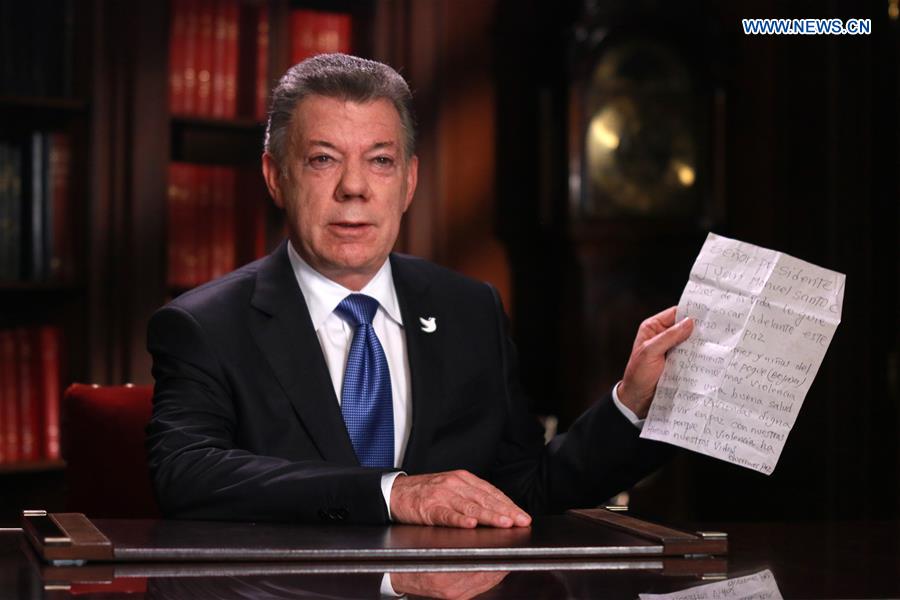
Image provided by the Colombian Presidency shows Colombian President Juan Manuel Santos making a statement in Bogota, Colombia, Oct. 10, 2016. The Colombian government and the National Liberation Army (ELN), the country's second largest guerrilla group, on Monday announced they will begin peace talks on Oct. 27. (Xinhua/Colombia's Presidency)
BOGOTA, Oct. 10 (Xinhua) -- The Colombian government and the National Liberation Army (ELN), the country's second largest guerrilla group, on Monday announced they will begin peace talks on Oct. 27.
The announcement came on the heels of the government's peace agreement with the Revolutionary Armed Forces of Colombia (FARC), the country's largest insurgency group, which was rejected in a plebiscite on Oct.2.
The peace negotiations with the ELN will be held in Quito, Ecuador, the two sides said in a joint statement issued from Caracas, Venezuela.
"I have good news," Colombian President Juan Manuel Santos said in a televised address Monday afternoon, and thanked his Ecuadorian counterpart Rafael Correa for agreeing to host the talks.
In a goodwill gesture, the ELN released a kidnaped victim to the International Committee of the Red Cross (ICRC) earlier in the day.
"I am pleased to report that the person who was freed is currently on the way to being reunited with his loved ones. The neutrality of the ICRC and the confidential dialogue between the parties involved in the armed conflict were crucial to the success of this operation," the head of the Red Cross delegation in Colombia, Christoph Harnisch, said.
The ELN has pledged to release two more captives before peace talks start.
"It was essential for the process of liberation to begin" before negotiations could go ahead, said Santos.
The man freed on Monday, Nelson Alarcon, spent three months in captivity. His release followed the liberation of two other civilians in the past two weeks.
"Three civilians have now been handed over by the armed groups in the past 15 days to delegates from the ICRC," the ICRC said.
So far this year, the ICRC has helped with the release of 14 people from the hands of armed groups, it added.
Monday's joint statement from Caracas said the two sides have already worked out an agenda to discuss issues including the participation of society in the peace process, democratic reforms, and reparations for victims.
The rejection of the peace deal with FARC in a national referendum doesn't seem to have dampened the ELN's desire to pursue its own peace deal.
Immediately after the referendum results were revealed, the ELN said that it called on "Colombians to continue to tirelessly fight for peace with changes."
"Now that we are making progress with the ELN, it will be a complete peace," said Santos.
This is the latest development in Colombia's peace process, three days after Santos won the 2016 Nobel Peace Prize on Oct. 7 for "his resolute efforts to bring the country's more than 50-year-long civil war to an end."
Santos initiated the negotiations that culminated in a peace accord between the Colombian government and the FARC.
After the peace deal with FARC was rejected, Santos began talks last week with leaders opposing the current peace deal to seek ways for reconciliation in the country. Former Colombian President Alvaro Uribe and other leaders of the opposition party, the Democratic Center, attended the meeting.
The government and the FARC also agreed on Friday to set up a "rapid and effective" process to "quickly" salvage a hard-won peace deal.
In a joint statement, they pledged commitment to the peace deal signed on Sept. 26, and to addressing doubts and concerns Colombians expressed in the plebiscite.
Colombia's peace process has drawn extensive attention and support from around the world. Cuba hailed the Monday annoucement of peace talks between the Colombian government and the ELN, calling it "a new step towards reaching a long lasting peace in Colombia" and voicing its support for it.
Reports say Cuba is expected to host the second stage of the peace talks to start in Ecuador.
After the peace treaty between the Colombian government and the FARC was rejected last week, United Nations Secretary General Ban Ki-moon has encouraged parties concerned to stay the course and work to "create a favorable environment for the political discussions that we hope will lead to a successful conclusion of the peace process."















